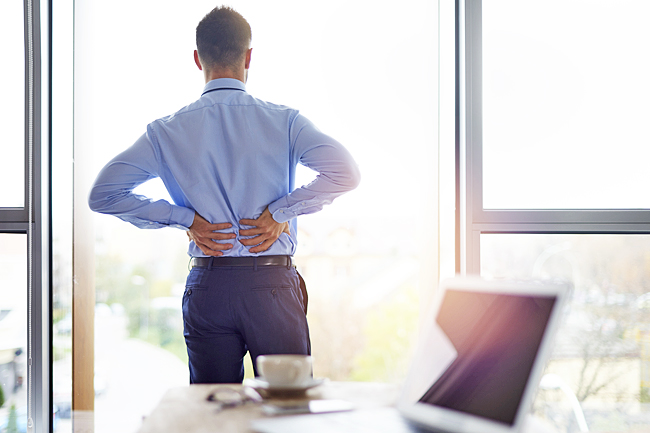CNA – Whether it’s the common cold or a reaction to dust or temperature change, sneezing is something we all do almost on a daily basis. But for those who have felt spasms of pain grip their back after a big, sinus-clearing “ah-choo”, they’d know that sneezing is not to be sniffed at.
In fact, sneezing-related back pain is rather common.
“We see around 10 to 20 patients a week who complain of back pain and/or shooting pain in the lower limb following sneezing or while stifling a sneeze,” said a senior consultant with Singapore General Hospital’s Department of Orthopaedic Surgery Dr Reuben Soh.
Dr Soh added that these patients are often “between 20 and 50 years old”. Furthermore, the odds of throwing your back out isn’t something that exacerbates with age, according to Adjunct Assistant Professor Jacob Oh, the head of spine surgery and senior consultant with the Department of Orthopaedic Surgery at Tan Tock Seng Hospital (TTSH).
In other words, you don’t have to hit old age to run the risk; it may happen at any time. “As far as I am aware, there is no major study that has shown that age increases the risk of sneezing-related back problems,” said Dr Oh.
WHAT’S CAUSING THE PAIN?
Sneezing is actually a very forceful action that causes your core muscles to tense up very suddenly, said Dr Oh. At the same time, the intervertebral discs, which are like shock absorbers in your spine, help to cushion the impact. Each intervertebral disc consists of the annulus fibrosus, a sturdy, tyre-like structure that encases a gel-like centre known as the nucleus pulposus.
But these shock absorbers can get busted if the sneeze is very forceful and repetitive, resulting in a herniated disc, said Dr Oh. A herniated disc is when the nucleus pulposus gets squeezed out of the annulus fibrosus and bulges into the spinal canal. This, in turn, can cause sciatica, which refers to the numbness or pain shooting down your leg. In some patients, said Dr Soh, the force from sneezing may even tear the annulus fibrosus.


WHO IS PRONE TO SNEEZE-RELATED BACK PAIN?
For those below the age of 50, sneezing may cause you to throw your back out if you’ve had a previous back injury, said Dr Soh. Similarly, you may be more prone if you used to do high-impact activities such as lifting heavy weights in the gym, or sports with repetitive actions such as tennis or competitive rowing. Dr Soh added that smoking and being obese are other contributing factors.
SHOULD YOU BRACE YOUR BACK BEFORE YOU SNEEZE?
There is no need to brace or tense your body, said principal physiotherapist from TTSH’s Department of Physiotherapy Ringo Yee. But straighten your body from a twisted or forward-bending position if you’re able to react in time, he said. If you’re seated, try to adopt a neutral upright posture.
Why is a forward-bending position bad for your back when you sneeze? “Sneezing builds up to 3.5 times the normal pressure in the discs compared to lying down,” said Dr Soh. Thus, bending forward while sneezing easily exerts a greater force on the discs, which can increase the risk of tearing the annulus fibrosus and herniating a disc.
SHOULD YOU STIFLE YOUR SNEEZE?
You shouldn’t. A healthy 34-year-old man did that and ended up busting his throat. The incident, which was reported in the medical journal BMJ Case Reports in 2018, mentioned that the unnamed patient tried to stop a sneeze by “pinching the nose and holding his mouth closed”.
Bad move because shortly after, his throat hurt when he swallowed and there was a “change of voice”. What’s more, his neck was swollen and when he moved it, there was an unsettling popping and crackling sensation. As it turned out, the patient had subcutaneous emphysema and pneumomediastinum. X-rays taken showed that the air that would have blasted from his nose and mouth made its way into the soft tissues of his neck instead.
The man recovered in a week or so, and continued to be well after a two-month follow-up. But can it happen to you? “This is rare in the context of the number of sneezes that happen on a daily basis all over the world,” said Dr Stephen Lee, a consultant and Ear, Nose and Throat (ENT) surgeon with Raffles Hospital.
“If you are just trying to lessen the loudness of your sneeze, it should not be harmful. But you do not want to totally suppress a sneeze as the sneeze is a defensive reflex to expel foreign particles from the upper airway,” said Dr Lee.
I’VE BUSTED MY BACK FROM SNEEZING – WHAT NOW?
Don’t panic, said Yee. “Gently try and get back to a neutral sitting or standing position, depending on what you were doing at the time of sneeze. See if you are able to move with relative ease.” If the pain persists beyond the sneeze, take note of where it is. You might also want to take it easy that day, meaning stay off vigorous physical activities, Yee advised.
However, that doesn’t give you the licence to lie in bed and do nothing. “Try and resume your daily activities as much as tolerated over the next few days. Most people recover from their low back pain episodes, so take comfort in that thought,” said Yee.
In the meantime, consult your general practitioner for some short-term pain relief. “It usually takes one to two weeks to recover,” said Dr Soh.
“But for patients with poor core strength, it can take up to six weeks for the pain to subside. In cases of an annular tear, healing usually occurs naturally between six weeks and three months.”
Yee added that if the pain is severe and lasts beyond four weeks, you might want to check in with a specialist. – Khoo Bee Khim







